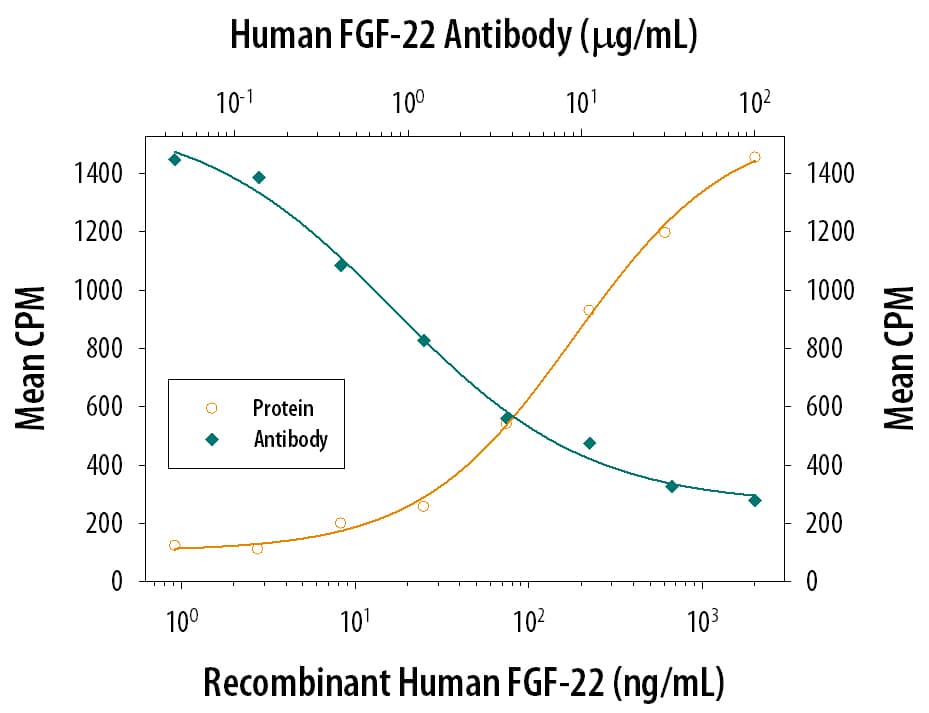Human FGF-22 Antibody
R&D Systems, part of Bio-Techne | Catalog # MAB3867

Key Product Details
Species Reactivity
Applications
Label
Antibody Source
Product Specifications
Immunogen
Thr23-Ser170
Accession # Q9HCT0
Specificity
Clonality
Host
Isotype
Endotoxin Level
Scientific Data Images for Human FGF-22 Antibody
Cell Proliferation Induced by FGF-22 and Neutralization by Human FGF-22 Antibody.
Recombinant Human FGF-22 (Catalog # 3867-FG) stimulates proliferation in the 4MBr-5 rhesus monkey epithelial cell line in a dose-dependent manner (orange line). Proliferation elicited by Recombinant Human FGF-22 (1 µg/mL) is neutralized (green line) by increasing concentrations of Mouse Anti-Human FGF-22 Monoclonal Antibody (Catalog # MAB3867). The ND50 is typically 1.5-7.5 µg/mL.Applications for Human FGF-22 Antibody
Western Blot
Sample: Recombinant Human FGF-22 (Catalog # 3867-FG)
Neutralization
Formulation, Preparation, and Storage
Purification
Reconstitution
Formulation
Shipping
Stability & Storage
- 12 months from date of receipt, -20 to -70 °C as supplied.
- 1 month, 2 to 8 °C under sterile conditions after reconstitution.
- 6 months, -20 to -70 °C under sterile conditions after reconstitution.
Background: FGF-22
Fibroblast growth factor-22 (FGF-22) is a 23 kDa, non-glycosylated member of the FGF-7 subfamily, from the FGF family of heparin-binding growth factors (1‑3). The human FGF-22 precursor is 170 amino acids (aa) in length, and contains a 22 aa signal sequence with a 148 aa mature region (4‑6). The mature region shows a centrally-placed, 120 aa beta-trefoil region (aa 43‑168) that is characteristic of all FGF family members. Human FGF-22 potentially has one alternate splice form. This isoform is 129 aa in length, and shows a 31 aa substitution for the first N-terminal 72 aa of the standard, or long, form (7). There is no information related to its possible function. Mature human FGF-22 is 86% aa identical to mouse FGF-22, with the mouse molecule showing a 9 aa deletion at the N-terminus (5). FGF-22 is synthesized by at least three cell types; keratinocytes, neurons, and skeletal muscle myotubes (4, 8, 9). In neurons and myotubes, FGF-22 is presumed to function as an organizer of the presynaptic apparatus. Expressed by postsynaptic (or target) cells, FGF-22 is believed to bind to FGF R2b on the surface of innervating processes, resulting in synaptic vesicle clustering, organization, and neurite branching (8, 10). Although FGF-22 is assumed to be secreted, little can be found in expressing cell culture media. Presumably, it is bound to 34 kDa FGF-BP1, which is a molecule described as typically associated with cell membrane proteoglycans (6, 11). Thus, following secretion, FGF-22 could quickly be immobilized by FGF-BP1, only to be released at a later time, or aided by FGF-BP1 in its interaction with FGF R2b (6, 10, 11).
References
- Itoh, N. and D.M. Ornitz (2004) Trends Genet. 20:563.
- Ornitz, D.M. and N. Itoh (2001) Genome Biol. 2:3005.1 Epub 2001 Mar 9.
- Nishimura, T. et al. (2000) Biochim. Biophys. Acta 1492:203.
- Beyer, T.A. et al. (2003) Exp. Cell Res. 287:228.
- Nakatake, Y. et al. (2001) Biochim. Biophys. Acta 1517:460.
- Beer, H-D. et al. (2005) Oncogene 24:5269.
- GenBank Accession # EAW61176.
- Fox, M.A. and H. Umemori (2006) J. Neurochem. 97:1215.
- Umemori, H. et al. (2004) Cell 118:257.
- Zhang, X. et al. (2006) J. Biol. Chem. 281:15694.
- Xie, B. et al. (2006) J. Biol. Chem. 281:1137.
Long Name
Alternate Names
Gene Symbol
UniProt
Additional FGF-22 Products
Product Documents for Human FGF-22 Antibody
Product Specific Notices for Human FGF-22 Antibody
For research use only
